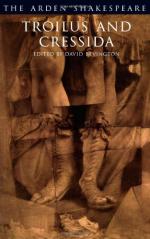|
This section contains 8,517 words (approx. 29 pages at 300 words per page) |

|
SOURCE: Bielmeier, Michael G. “Ethics and Anxiety in Shakespeare's Troilus and Cressida.” Christianity & Literature 50, no. 2 (winter 2001): 225-45.
In the following essay, Bielmeier uses the philosophical works of Kierkegaard to demonstrate that Cressida and the bastard Thersites are the most ethical characters in the war-torn world of Troilus and Cressida.
In his seminal study titled Shakespeare, Our Contemporary, Ian Kott evaluates Troilus and Cressida from the prevailing European existential perspective of the mid-twentieth century. He sees the play as “a dispute about the existence of a moral order in a cruel and irrational world.” He further states that the characters are aware of the “absurd” nature of the world in which they live and that they must “give it a purpose in order to preserve the sense of the world's existence and a scale of values” (77).1 A Kierkegaardian existentialist reading, however, differs rather dramatically from Kott's.2 From a Kierkegaardian...
|
This section contains 8,517 words (approx. 29 pages at 300 words per page) |

|


